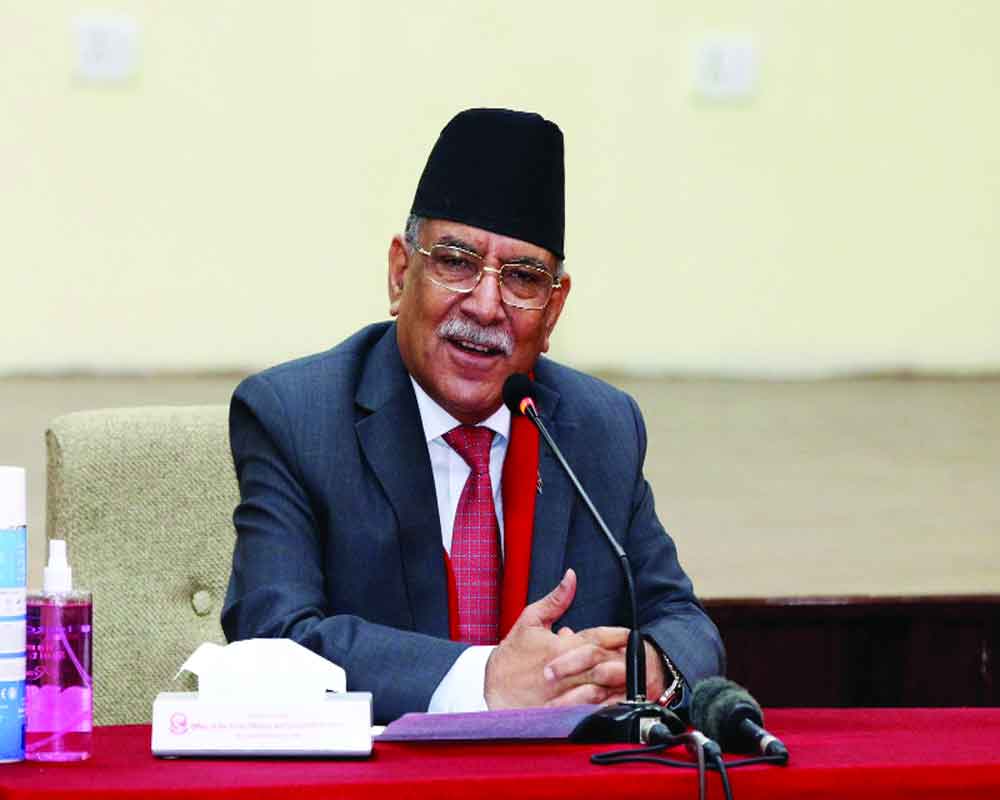Nepal’s former Prime Minister Pushpa Kamal Dahal has aligned with his arch-rival KPS Oli to retain power. This could lead to a tilt towards China
A saying adapted from the play ‘The Tempest’ by William Shakespeare, “Misery acquaints a man with strange bedfellows,” emphasises the peculiar alliances that can form in politics driven by common interests rather than personal affinities. This adage finds resonance in the recent political developments of Nepal, where former Prime Minister Pushpa Kamal Dahal, popularly known as ‘Prachanda,’ has forged an unexpected partnership with his longstanding adversary and political rival, KPS Oli, to retain the Prime Minister’s chair for the third time within a mere span of 15 months.
The Himalayan Kingdom has witnessed a whirlwind of political manoeuvring, with Prachanda showcasing his adeptness in navigating the turbulent and uncertain political landscape to his advantage. While his ability to secure power may appear as a significant achievement on a personal level, it has raised concerns both domestically and internationally, particularly among neighbouring countries like India and the United States.
The current political trajectory in Nepal, with its potential tilt towards China, has set off alarm bells in New Delhi and Washington. Given the pro-China inclinations of the current government in the Maldives and the strained relations with Pakistan, there is a palpable apprehension about Nepal slipping away from India’s traditional sphere of influence. This apprehension is further fueled by the ideological commitment of the emerging communist-dominated coalition government in Nepal towards Beijing.
In contrast, India has been nurturing friendly relations with neighbouring countries like Bangladesh and has made efforts to mend ties with Sri Lanka, notably intervening to prevent an economic collapse. However, China’s response to such initiatives has been muted, reflecting a strategic ambiguity. Amidst these geopolitical dynamics, the unexpected turn of events in Nepal has emerged as a cause for concern.
Observers of Nepalese politics attribute the rift between Prachanda and the Nepali Congress, a former coalition partner, to contentious governance issues. Despite their shared enmity towards Oli, their inability to reconcile crucial matters led Prachanda to distance himself from the Nepali Congress. This realignment, which has shifted the balance of power, necessitates a recalibration of India’s foreign policy priorities to navigate the evolving political landscape in Nepal effectively.
Of particular significance is the fate of the trilateral power agreement signed during Prachanda’s visit to New Delhi, aimed at importing 10,000 MW of power from Nepal to India over a decade. This agreement, a breakthrough after years of stalemate, holds immense economic potential for both countries. However, the ascendance of the new communist regime in Nepal raises concerns about its continuity, posing a potential setback to bilateral energy cooperation.
Additionally, the approval of the citizenship bill by the Prachanda-Deuba government was perceived as a gesture of goodwill towards India and the United States, much to China’s chagrin. Prachanda’s decision to prioritise India over China in his inaugural visit in 2022 yielded positive outcomes, evident in the signing of multiple bilateral agreements. However, the recent political realignment raises doubts about the sustainability of this pro-India stance.
Prachanda’s manoeuvring has effectively sidelined the Nepali Congress and CPN (UML), despite their larger parliamentary representation. Prachanda’s alliance with Oli in 2022, followed by a subsequent fallout and a renewed partnership, underscores the fluidity of Nepalese politics. The emergence of a new communist-led coalition challenges the traditional dominance of pro-India forces, necessitating a strategic reassessment in New Delhi.
The dominance of Oli’s faction in the new government poses a formidable challenge for India, given his history of antagonizing India-Nepal relations.
Oli’s controversial actions, such as redrawing the political map to include Indian territories and opposing strategic infrastructure projects, have strained bilateral ties. India’s apprehension about Oli’s proclivity towards China is exacerbated by Beijing’s strategic interests in the region.
Furthermore, China’s ambitious Belt and Road Initiative (BRI) presents a potential security risk for India, given the open border shared with Nepal. China’s significant investments in Nepal, coupled with its strategic objectives, underscore the need for India to remain vigilant. Any further consolidation of Chinese influence in Nepal could have far-reaching implications for regional stability and India’s security interests.
In the realm of defence cooperation, India’s Agneepath scheme, aimed at recruiting Nepalese youths as Agniveers, remains mired in controversy. Despite the scheme’s potential to address unemployment and enhance bilateral defence ties, opposition from certain quarters in Kathmandu has stalled its implementation.
The reluctance of successive Nepalese governments to endorse the scheme reflects broader geopolitical considerations and internal power dynamics.
Now India faces the daunting task of recalibrating its foreign policy to safeguard its strategic interests in the region. The growing influence of China poses a formidable challenge, necessitating closer cooperation with like-minded partners.
(The writer is a political analyst; views are personal)


























